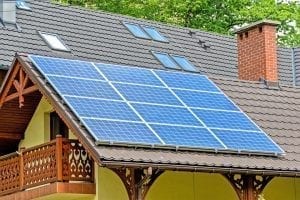Small businesses can look to save 10-30% on energy bills through energy efficiency initiatives and thus experience larger profit margins.
Thousands of American lives have suffered due to the COVID-19 pandemic. Beyond the nation’s health, COVID-19 has devastated the American economy. Every single industry is reeling from decreased business; from airlines, to restaurants, retail, and finance alike. The spike in the unemployment rate has also become apparent. Now, more than ever, there is an urgent need to address these economic challenges. The government has released a $2 trillion stimulus package in response to the situation, with Americans around the country receiving stimulus checks to help them with their hardships. Unfortunately, this package is only a short-term solution, and the country needs a long-term answer to the problem that COVID-19 has presented.
Policymakers are making efforts to kickstart the economy in many ways. Economic growth can pave the way for America’s competitiveness in the future. It is also imperative the country begins to prioritize climate related initiatives, while simultaneously rebuilding the economy shaken by the coronavirus. Increasing low-carbon investment can be one avenue for economic profit. It can lead to job creation and reducing the damages inflicted by COVID-19. Let’s take a look at some of the opportunities in the green energy sector.
Areas to focus on for economic rebuilding initiatives by Beth Debouvre
Energy-efficient realty properties
In the energy sector, the energy-efficiency industry has been the leading employment generator. In the last five years, this specific energy sector has added over 400,000 jobs, more than any other industry. The jobs are mostly local, which is another pro for this specific industry. The energy efficiency experts believe this sector has the potential to grow beyond these numbers as well. Multiple measures must be in place to sustain long term growth in the industry. For example, the presence of high energy performing technologies is mandatory in the reduction of fuel-fed heating device use.
Estimates project every one million dollars’ worth of investment can lead to full-time employment opportunities for eight people in the field of energy efficiency. Beth Debouvre and other entrepreneurship analysts underscore that this employment capacity is almost three times higher than the fossil fuel sector.

Aside from these benefits, energy efficiency can also help in savings generation. Both homeowners and businesses can cut down their utility costs and redirect these savings more efficiently. These savings can be especially meaningful for low-income groups who are struggling due to the economic meltdown caused by the novel coronavirus outbreak. Small businesses can look to save 10-30% on energy bills through energy efficiency initiatives and thus experience larger profit margins.
Eco-friendly public transportation
A large section of the American populace relies on their local public transit system to travel to their workplace and leisure activities. The existing transportation structures around the country are old and could benefit from serious investment. Public transit companies are likely to face more difficulties in the next months due to lower use and increasing cost of operation due to safety regulations, including sanitization and decreased rider capacity. It may seem strange to turn towards zero-emission systems, but the implementation of this type of infrastructure, especially in urban regions, could prove to be useful for economic growth. To reach this point of implementation, equipment production, construction, and other supply materials need to be readily available. From a long-term view, spending $232 billion over a decade could lead to an economy worth $928 billion in around twenty years. Every one-billion dollar investment in public transportation has the potential to generate over 50,000 jobs.


Join the conversation!